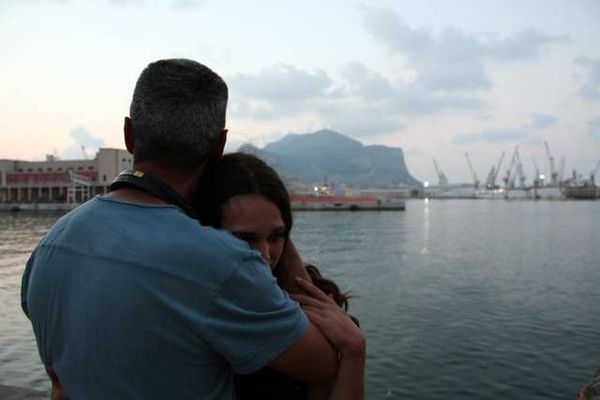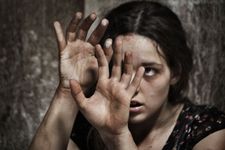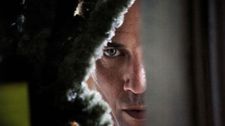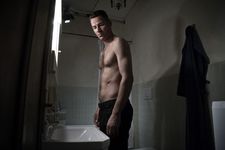 |
| All at sea in Salvo |
Getting its UK première at the Glasgow Film Festival, screening as part of the Italian Film Festival and now on general release, Salvo is the story of a hitman whose worldview begins to change dramatically when he meets a young blind woman. I spoke to co-writers and co-directors Antonio Piazza and Fabio Grassadonia when they were visiting London, and asked what it was that inspired this unusual fusion of genres.
“The first thing, for us, was to write a Sicilian film,” Antonio said. “For years and years we had worked together as writers for other people, on other people’s films, and at some point we felt we needed to tell our own story. We wanted it to be about Sicily, the place where we were born.
“For some time we’d had this image, this scene of a Mafia hitman being in front of a blind girl – this moment of confrontation just after some violent things had been happening. The image was striking for us and we wanted to find the meaning of it. We also wanted to challenge the stereotypes of the Sicilian story.”
The film looks a lot like a western to me, I noted, and I asked if that was something they had in mind at the start.
“Not from the very beginning,” Antonio responded. “But when were location scouting we found the abandoned mine where Salvo takes Rita. It’s right in the middle of a fishery and close to the mine there’s even a ghost town where the miners used to live. That helped to give it a spaghetti western touch.
I asked about the striking shifts between light and dark in the film. Was that something they wanted to do from the outset.
 |
| Sara Serraiocco as Rita |
“Yes,” says Fabio. “That comes from an idea we had regarding the story. We wanted to start the story as a noir, set in Sicily, being summer. We wanted this atmosphere especially where Salvo meets Rita for the first time, in the house. Rita is the queen of this house but also a sort of prisoner, and there’s a sort of unconscious dancing between them in the dark.” Does he feel the power balance changes when they’re in the dark? I asked. Antonio translated for me; Fabio apologised for his limited English but really didn’t need to, often delivering elegant turns of phrase.
“It’s definitely connected to blindness,” Fabio agreed. “It lets the audience have a sense of blindness because in this film what you don’t see is as important as what you do see, especially with the character of Rita. It’s connected to this idea of framing and what’s out of frame and what you hear. And Rita doesn’t need any light in her house, obviously. It’s her kingdom, a realm of shadows.”
The casting of Rita, he told me, was a very difficult process.
“We didn’t want a famous actress because we wanted the audience – especially the Italian audience – to see Rita and really believe that she’s blind... It was a long casting. We met hundreds of girls before we met Sara Serraiocco but she had something different, a very personal take on the role. Sara was not an actress before this film; she was a dancer and a teacher of dance for children. We recognised something in her. She has an old style beauty, like from another age. She had a secret sense of the character, but because she was a last minute arrival she was a risky choice for us and for the producers.
I asked how they came to cast Saleh Bakri in the title role.
“In a very different way,” said Fabio. “We had this idea in mind of the character as an Italian Samurai. From early in the development of the script we knew that we wanted to play with his eyes. The charismatic presence of the eyes onscreen was important. Then we saw this film called The Time That Remains and we really liked it but it was Palestinian. In that film Saleh was playing what was also a very silent character, so we decided to try. We sent him the script and the short film, Rita [the directors’ first exploration of the blind girl confrontation]. He really like it so he came to meet us in Rome and we liked each other from the start. He’s a very intelligent and generous person. He had to wait a long time while we were delayed because of financing problems. The film was postponed twice and he studied Italian in the meantime. He couldn’t speak a word of Italian before, but in the film he does all his own dialogue. He didn’t have to be dubbed.”
 |
| Charismatic eyes |
“It has been a long process,” Antonio added, on the subject of delays and financing. “Because it’s a first feature and it’s not a comedy, in Italy at the moment it’s quite hard to finance this kind of film.” Fortunately they were able to set up a co-production with France, which helped in securing funds. “We also had some support from the Ministry of Culture and the Sicilian Film Commission, because the film was set and shot in Sicily. We didn’t get the amount of money we’d hoped to have for the shoot but after four years we just decided, let’s go with what we have and we will try our best.”
This meant they had just five weeks to shoot in. Many shots in the film are very precise and must have taken a long time to set up. I asked them how they managed this.
“We were running against time, always,” said Antonio. “We were lucky at the beginning in the house of Rita because we had chance to prepare.”
The preparation was lengthy. It included Sara wearing a blindfold for two months before the shoot began, and Antonio noted that on the set itself she wore specially made blinding contact lenses so that she would have to think and move in the same way.
 |
| Saleh Bakri as Salvo |
In the early scenes, they had to take their time to set up steadicam shots and make sure long takes would work. “We were simply not able to make any mistakes without the money and without the time. We’re grateful that we were lucky with our collaborators, the actors especially. We never repeated a scene because of them. Maybe because we wanted something a bit more or because there was a technical problem, but never because of the actors.”
So what’s next for the two of them? I wondered if they might prefer to go back to writing for a while after all that effort, but Antonio made it clear that they’ve both been bitten by the directing bug.
“The second film will be again a Sicilian story but we like genre. As we played with genre for Salvo with noir, spaghetti western and thriller and action elements, our next film will explore a different genre. It’s a love story and it’s also a ghost story.”
He added that he hopes getting things moving will be quicker this time around.





















